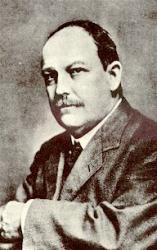
1825 - 1897 Person Name: Lawrence Tuttiett Topics: Resolution Author of "Go Forward, Christian Soldier" in Pentecostal Hymns Nos. 5 and 6 Combined Laurence Tuttiett was born at Colyton, Devon, in 1825; was educated at Christ Hospital, and at King's College, London; ordained Deacon, 1848, Priest, 1849; entered upon the living of Lea Marston, Coleshill, 1854, and subsequently was appointed Curate of S. Paul's, Knightsbridge, London. He is the author of several volumes and tracts.
--Annotations of the Hymnal, Charles Hutchins, M.A. 1872.
==================
Tuttiett, Lawrence, son of John Tuttiett, surgeon in the R.N., was born at Cloyton, Devonshire, in 1825, and educated at Christ's Hospital, and King's College, London. It was originally purposed that he should follow the medical profession, but, abandoning it for the ministry, he took Holy Orders in 1848. In 1854 he became vicar of Lea Marston, Warwickshire; and in 1870 incumbent of the Episcopal Church of St. Andrews, Scotland. He was also preferred to a prebendaryship in St. Ninian's Cathedral, Perth, in 1880. He is the author of several manuals of prayers, published by the Society for Promoting Christian Knowledge and other prose works, and also of:—
(1) Hymns for Churchmen, 1854; (2) Counsels of a Godfather, 1861; (3) Hymns for the Children of the Church, 1862; (4) Germs of Thought on the Sunday Services, 1864; (5) Through the Clouds; Thoughts in Plain Verse, 1866.
From those works and other sources the following hymns have come into common use:—
1. As calmly in the glowing west. Evening.
2. Come, our Father's voice is calling. Confirmation. Appeared in his Hymns for the Children of the Church, 1862, in 6 stanzas of 4 lines. It passed into Mrs. C. Brock's Children's Hymn Book, 1881.
3. Grant us Thy light that we may know. Divine Guidance. Included in his Germs of Thought, &c, 1864, in 6 stanzas of 4 lines. In Horder's Congregational Hymn Book, 1884; the Universal Hymn Book, 1885, it begins, “O grant us light that we may know."
4. I come, 0 Father kind. Holy Communion.
5. Lo, like a bride, in pure array. Septuagesima.
6. No sign we ask from heaven above. After Holy Baptism. Published in his Hymns for Churchmen, 1854, in 4 stanzas of 6 lines. It has passed into several collections, includ¬ing the S. P. C. K. Church Hymns, 1871, Thring's Collection, 1882, &c.
7. Now, eternal Father, bless. Holy Baptism. In his Hymns for the Children of the Church, 1862, in 3 stanzas of 6 lines, and Mrs. Brock's Children's Hymn Book, 1881. In the latter it is attributed to Bishop Maclagan in error.
8. 0 happy Christian children. Divine Protection. From his Hymns for the Children of the Church, 1862, into Mrs. Brock's Children's Hymn Book, 1881, &c.
9. 0 Jesu, ever present. The Good Shepherd. Published in his Germs of Thought, 1864; the S. P.C. K. Church Hymns, 1871, and many others.
10. Shepherd, good and gracious. The Good Shepherd. In his Hymns for the Children of the Church, 1862; Mrs. Brock's Children's Hymn Book, 1881, &c.
11. Sometimes o'er our pathway. In time of Trouble. From his Hymns for the Children of the Church, 1862, in 3 st. of 8 1., into Mrs. Brock's Children's Hymn Book, 1881.
12. When the world is brightest. Litany to the Saviour. Published in his Through the Clouds, &c, 1866, in 10 stanzas of 8 lines, with the note :—"Those words were written for the music of a Roman Litany 'Ave Stella Maria.'" This Litany is in extensive use.
13. Who is this? the long expected. Advent.
In addition to these, several of Mr. Tuttiett's hymns are annotated under their respective first lines, the most popular of which are, "Father, let me dedicate"; "Go forward, Christian soldier"; and "0 quickly come, dread Judge of all." Mr. Tuttiett's hymns are characterised by smoothness of rhythm, directness of aim, simplicity of language, and deep earnestness. Those for special services and seasons are of great merit. He died May 21, 1897.
-- John Julian, Dictionary of Hymnology (1907)
==================
Tuttiett, L., p. 1188, ii. He was born at Colyton, not Cloyton, Devonshire, in 1825. His hymns "As now Thy children lowly kneel (For the Young), and "Give light. O Lord, that we may learn" (The Light of Life) are in Hymns Ancient & Modern, 1904.
--John Julian, Dictionary of Hymnology, New Supplement (1907)
=====================
See also in:
Hymn Writers of the Church
L. Tuttiett


 My Starred Hymns
My Starred Hymns



